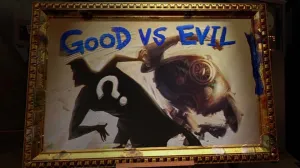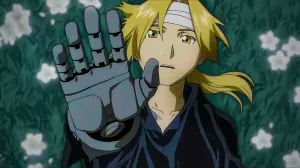From the moment the first issue of Watchmen arrived in 1986, the landscape of superhero comics was forever changed. The series, from writer Alan Moore, artist Dave Gibbons, and colorist John Higgins, redefined how people considered the genre, deconstructing the very idea of superheroes with its alternate history story of superpowered entities and their impact on world events and politics. It’s a story that has, nearly 40 years later, maintained its popularity, spawning prequels and sequels and various adaptations both in animation and live action as well. The story — or at least its concept — is so seminal that pretty much every superhero story that approaches superpowered people as something other than do-gooders here for the benefit of humanity has found itself compared to Watchmen. It makes sense: every new decade seems to want its own Watchmen.
Videos by ComicBook.com
The latest comic to get such a comparison is The Power Fantasy. From writer Kieron Gillen and artist Caspar Wijngaard, the Image comic debuted in 2024 and almost immediately there were some big comparisons between The Power Fantasy and Watchmen. With both stories featuring a small group of flawed superpowered individuals and their interactions in world events — and the precarious position those interactions put humanity in — it’s easy to see why the two stories would, on the surface, seem similar. However, while The Power Fantasy owes a lot to Watchmen for paving the way, it’s simply not the same. It might actually be better.
What Was Watchmen About?

Given that Watchmen has become a piece of art that is so deeply ingrained in popular culture that it’s had countless imitators and expansions, it’s worth taking a moment to refresh ourselves on what Watchmen is about. Set in an alternate reality where the emergence of superheroes has dramatically altered the course of U.S. (and world) history, the story picks up in 1985. With superheroes having grown unpopular with the public leading to them being outlawed, the murder of a man named Edward Blake prompts investigation by a costumed vigilante, Rorschach. Blake, it turns out, was the real identity of The Comedian, a costumed hero working with the U.S. government.
As Rorshach investigates, he reaches out to his former fellow heroes — Daniel Dreiberg/Nite Owl, Jon Osterman/Doctor Manhattan, Laurie Juspeczyk/Silk Spectre, and Adrian Veidt/Ozymandias — to warn them, believing that Blake’s murder is part of a larger plot against costumed heroes. Of course, the former superheroes have issues of their own. Doctor Manhattan is incorrectly accused of being the cause of cancer in those close to him, prompting him to exile himself to Mars, which heightens tensions between the U.S. and the Soviets, Veidt is nearly assassinated, and Juspeczyk begins a romance with Dreiberg and resume vigilante efforts. The story culminates in Rorschach and Dreiberg finding evidence that Veidt may be behind the conspiracy against the heroes. It turns out that they are right. Veidt has been setting things up as part of a plan to prevent nuclear war via staging a fake alien invasion that would in turn see heroes come back into fashion… at the cost of half the population of New York. He murdered Blake when Blake discovered the plan as well as orchestrated all the obstacles the others encountered in their investigation. Ultimately, the heroes are too late to stop Veidt, and the squid attack takes place, resulting in mass death and destruction. While Veidt’s act is horrific, he wasn’t wrong about it bringing about peace and the heroes decide to keep the truth a secret after deeming the truth would do more harm than good. Doctor Manhattan also ends up killing the dissenting Rorschach to ensure silence. Things end on a somewhat bleak note with Doctor Manhattan declaring that “nothing ever ends” — and a fringe publication receives Rorschach’s journal, suggesting that the truth may still come out someday… if anyone will listen.
The Power Fantasy Has Big Similarities — and Differences

On the surface, The Power Fantasy does seem eerily like Watchmen. It, too, is an alternate reality with the emergence of six super powered people altering history. The title, which is only six issues in at this point, hasn’t fully revealed all the ways that the superpowers have impacted geopolitical events, but we get some big reveals, including that in 1969 the government tried to get rid of one of the most powerful of the people — Valentina — nuking a music festival in New Mexico she was attending. It didn’t harm her but led her to exile herself to protect others and led people to believe that she herself was radioactive. As the story is unfolding, we learn more and more about these superpowers — the so-called Nuclear Family or Atomics — and how they came together to co-exist while also keeping reigns on humanity in what they see as their protecting them from, well, themselves. There’s even one of the group, Magus, who is revealed to be working with the government after their most recent attempt to kill another superpower, Heavy.
[RELATED: In The Power Fantasy #6 The Government Takeover Will Continue Until Morale Improves (Review)]
But beyond the superficial similarities, The Power Fantasy is nothing like Watchmen. The biggest deviation is the relationship between the Nuclear Family members. While the heroes in Watchmen were still on relatively decent terms with one another despite no longer being active, the powered people of The Power Fantasy aren’t close at all. Over time, their “family” has fractured with none of them seemingly fully trusting of each other and indeed, it’s shown that there are secrets and manipulations at play across different factions within the family. This is a family with bitterness and secrets, which is not something you want with these people having self-appointed themselves the guardians of humanity. It makes for a very different dynamic and that is what sets the series apart: we’re one bad family falling out from utter destruction.
It’s the Humanity of the Superpowers That Makes The Power Fantasy Better

While Watchmen certainly had elements of humanity within its powered characters, at its core the story was more a “what if” scenario asking the question of what it would truly be like for super powered people to live among us, especially if they had the power of life and death over us all. The Power Fantasy takes that concept — the “what if” of it all — but makes it less about what they can do for and to weak, defenseless humanity and more about the humanity of the super powered people themselves. At its core, The Power Fantasy is a story about a very badly broken family on a dangerous collision course. It’s a story that is enriched by the stakes — after all, the safety and well-being of humanity is at risk if things end up going boom — but for all the elements of the story that function around the superpowers and their roles, it’s what they are doing to each other that is of real interest and the storytelling.
Knowing that we’re dealing with these extremely human superhuman beings in turn makes the base story even more chilling. There’s deep anti-superpowers sentiment, leading to one of them, Heavy, creating an off-world safe haven that threatens humans so much they try to have him killed and when it takes extreme measures to talk Heavy down from retaliating, the deeper fractures in the family start to show. Those deeper fractures include a fed-up Magus who has apparently always had an inflated sense of self who capitalizes on the growing rift to align himself with the government, essentially becoming an unelected leader with obscene amounts of power beyond his superpower skills, something with eerie similarities to real-world events in American politics. And seemingly playing all sides against the middle is Etienne, a Charles Xavier-meets-Doctor Manhattan type who is on every most wanted list in the world for killing everyone involved in the attack on Heavy with a mere thought but it’s not his terrifying powers that make him perhaps the scariest of them all; it’s the illusion he presents even to himself of being ethical and, in turn, focused on humanity. Of all the superpowers we’ve met thus far, he’s the most chilling because not only is he playing all sides against the middle, but he’s the only player we’ve really met (there are still a few superpowers we’ve not formally met) whose motivations are obscured and who might actually believe his own lies.
To put it another way, while Watchmen was a sort of deconstruction of superheroes by taking them to darker places than we would expect from Superman and the like, The Power Fantasy is more of a confrontation, asking the far more frightening question of “what if superpowered beings are exactly like we are, just without limits?” Given how complicated, flawed, and often tribalistic human beings are, it’s this inversion of things that makes the story more complex and far more relevant, offering the space to take the reader deeper into the darkest corners of the human experience because, after all, these superpowered beings are sort of human themselves.
Watchmen will always be something of a gold standard when it comes to deconstructionist superhero stories. Before it, there really wasn’t much in the way of a serious critical look at the world of superpowered characters. The quality of the work cannot be disputed. But every generation finds ways to improve upon the past and The Power Fantasy is doing just that. By leaning into what the Nuclear Family can do to one another and the wild, unsettlingly relatable humanity of that even as they have godlike abilities, Gillen and Wijngaard are setting a new standard. They’re answering the question of “who watches the Watchmen” and it turns out that “they watch themselves” is not only the answer, but it’s perhaps more dangerous than anything we’ve ever seen. And it rules.
The Power Fantasy #6 is on sale now.








